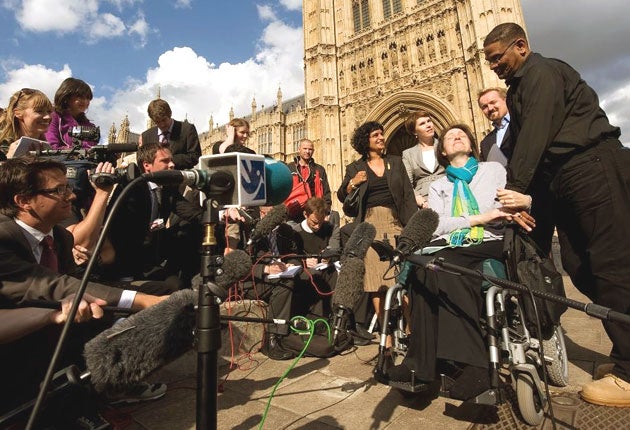Debbie Purdy: 'We've got our lives back'
Campaigner triumphant after Lords victory to clarify law on right to die

Debbie Purdy, who has dedicated her living days to winning the right to plan her death, made legal history yesterday when five law lords backed her landmark appeal to have the law on assisted suicide clarified.
The 46-year-old campaigner, who has multiple sclerosis, was "ecstatic" after the peers unanimously supported her call for the Director of Public Prosecutions to spell out the circumstances in which her husband or someone in a similar position might face prosecution for helping a loved one end their life abroad.
Having lost twice in the High Court and Court of Appeal, yesterday's decision brought huge relief. Flanked by her husband, the Cuban violinist Omar Puente, and to cheers from her supporters, Mrs Purdy said after the ruling: "I'm ecstatic. I am eagerly awaiting the DPP's policy publication so that we can make sure what we do does not risk prosecution. I think people are beginning to realise now that this is not about a right to die; it is about a right to live.
"It feels like everything else doesn't matter and now I can just be a normal person. It's terrific. It gives me my life back. We can live our lives. We don't have to plan my death."
Responding to the ruling, the DPP Keir Starmer, QC, said prosecutors would start work immediately to produce an interim policy by September, followed by a public consultation before the final policy is published next spring. "This is a difficult and sensitive subject and a complex area of the law," he said. "However, I fully accept the judgment of the House of Lords. The Crown Prosecution Service has great sympathy for the personal circumstances of Mrs Purdy and her family."
The decision will bring relief to scores of people facing similar dilemmas. More than 100 UK citizens with terminal illness or facing intolerable suffering have travelled to the Dignitas clinic in Switzerland with friends or relatives to end their lives. No one has been prosecuted but the risk is always there. Under the present law, anyone who helps facilitate a suicide faces up to 14 years in jail.
Giving judgment in Mrs Purdy's case yesterday, the law lords said the DPP should be required to set out an "offence-specific policy", identifying the facts and circumstances that he would take into account in deciding whether it was in the public interest to prosecute under the Suicide Act.
Experts said the ruling meant it was no longer acceptable for the DPP to decide what was a crime on a case by case basis and that after he had set out the principles that would exclude prosecutions for compassionate assistance, the law would effectively have been changed. But the law lords said the ruling did not decriminalise assisted suicide, which was rejected after a highly charged debate this month by peers in the House of Lords sitting as the second chamber of Parliament and not as a court.
Mrs Purdy suffers from progressive multiple sclerosis which could mean she faces an undignified and distressing death. That might be avoided if she were able to travel to Dignitas to end her life peacefully.
Her dilemma was that unless the law was clarified she might be forced to end her life sooner than she planned, while she was still able to travel to Switzerland independently, to avoid the risk of her husband being prosecuted for assisting her. If the risk of prosecution was sufficiently low, she could wait until the very last minute before travelling with her husband's assistance.
The law lords said: "Everyone has the right to respect for their private life and the way that Mrs Purdy determines to spend the closing moments of her life is part of the act of living. Mrs Purdy wishes to avoid an undignified and distressing end to her life. She is entitled to ask that this too must be respected."
Campaigners hailed the victory as bringing an end to the "legal muddle" over assisted suicide. Pressure for a change in the law has grown. The Royal College of Nursing declared this month it was dropping its opposition to assisted suicide and adopting a neutral stance.
Sarah Wootton, chief executive of Dignity in Dying, said: "This historic judgment ensures the law keeps up with changes in society and, crucially, provides a more rational deterrent to abuse than a blanket ban which is never enforced."
Subscribe to Independent Premium to bookmark this article
Want to bookmark your favourite articles and stories to read or reference later? Start your Independent Premium subscription today.

Join our commenting forum
Join thought-provoking conversations, follow other Independent readers and see their replies